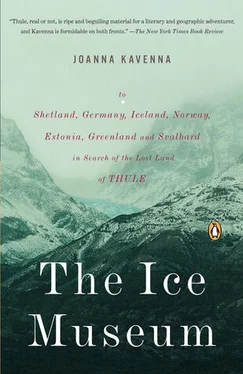The human history of Greenland was a series of faint voices, drowned out by the winds, a few ragged settlers struggling to hunt, stumbling across the ice-plains. At some stage in the deep past, a few Inuit came from Canada, dwindling or retreating through the years, to return again centuries later. Much later, there had been hunters along the coasts, European whaling ships firing shots at the seals and walruses, bringing home narwhal tusks which were occasionally mistaken for the horns of unicorns, so mixed up were fantasy and reality in contemplation of the ancient north. There were Inuit stories about these hunters: a Greenlandic tale called “The Man Who Could Not Be Looked At by the Europeans” about a Greenlander who was blessed with a magical quality which meant that the European whalers could not look at him, even when he stole supplies from their boats. It was a story of wish-fulfilment for the Inuit who saw the European whalers sailing off with their hunting spoils. Until the twentieth century, Inuit numbers never rose to more than a few thousand. Guns had helped the Inuit survive, and had allowed their population to increase. They had spent the twentieth century gradually losing their traditions, moving into more modern, Danish-built houses along the coast. But they had continued to hunt and fish along the coasts.
The century had hardly changed the superficial view. Greenland was the whitest land in the world, the most immense ice cap in the north. The ice cap was blank and impressive. The bergs were protean and graceful, rocking gently on the waves. The winters were harsh; the land fell under darkness, though the sky was rich with the Northern Lights. Going up that coast was like travelling back to the Ice Age, when ice rioted across the mountains, when ice was the only presence on the land. The air was frigid and taut. The long stretches of the coastline ran on, deserted, into the glinting whiteness of the ice. On the grey beaches nothing moved, the sea flowed into the fjords, through tight channels of rock. The waters splashed the bergs, the bergs drifted silently alongside the boat. It was the stillness of an implacable force brooding, a force with an intention I couldn’t perceive, couldn’t recognize. I couldn’t get used to it, I saw it all the time, at the edge of vision. I pushed the mysterious stillness away, but I felt it all the time, I dreamt of the ice.
There were no settlements for a few days.
The ship moved through the emptiness, creeping along the coast towards Thule. The birds emitted occasional cries; the glaciers rumbled in the distance. At night, I was sometimes woken by the gun-crack of ice against the hull, as the ship barged through the smaller bergs, which lay almost flat against the surface of the sea. I stood through the hours on the icebreaker, watching the shore for signs of life. There were the same immeasurable rocks, shattered by the force of the ice. The same prismatic flood of colours, staining the rocks. The bergs massed around the ship, hemming it in. The ship hit the bergs like steel against steel, the ice was so ancient and compressed.
Sometimes small things happened, looming large against the stillness. An Austrian became so drunk that he slid from his bar stool and lay pretending to be a seal on the floor of the saloon, laughing until he cried. Because of this, the bar woman refused to serve anyone before 4 P.M., but the scientists came and hammered on the grill, a morning chorus of plaintive voices begging for relief, so she re-instituted the earlier system, which allowed everyone to be drunk by noon. The captain shouted at his son, who was one of the crew. He screamed along the deck, swearing in Russian, and his son looked haughty and offended. Later they laughed and joked and sang drinking songs. The first mate told me he had a feeling for ice. He was from the Ukraine; he spent most of the time icebreaking around the Russian Arctic port of Murmansk. He knew the ice, understood its shifting moods, its rigid quality, he said. Standing upright on the bridge, he said there was a science of ice. And there was a religion of ice. Ice charts, material predictions, and then the less determinate sense of the ice, of what it might do.
There was a red light flickering in the distance while he spoke, which the captain said was a helicopter. Someone else, one of the German scientists, said mockingly, ‘Can it really be a helicopter? When we are thousands of miles from the nearest landing strip?’
The captain shrugged. ‘Helicopter,’ he said. ‘Or perhaps Sirius Dog Star.’
There is an exact process, the first mate was saying, an exact process for moving through the ice.
The German scientist was still sceptical. ‘Sirius Dog Star?’ he was saying. ‘You mean the Sirius Dog Star which is not visible with the naked eye?’
There was a pause. The captain grabbed a chart. ‘Not Dog Star,’ the captain said, rustling his charts, staring at the red shape. ‘It is Jupiter,’ he added, with certainty.
‘Perhaps,’ the German scientist said, trying not to smile, ‘it might be Mars.’
And the captain laughed uproariously—he slapped the scientist on the back. ‘MARS!’ he laughed. ‘ Mars! You’re mad!! You are a crazy German!’
The captain glared at the red shape of Mars.
After a few days of empty coast, there was another small town spreading up the hillsides, with a runway carved out on the flattened mountaintop. A pile of rubbish was burning by the shore; smoke drifted across the beach. The children clustered around a football match, near the kiosk which had a sign saying THIS WAY FOR BEER in Danish. The dogs whined and dragged at their chains, sniffing through the dirt. Outside the houses, objects were strewn across the grass—outboard motors, clothes, boxes, metal parts, fishing nets, boots, kayaks, rowing boats, and then the rubbish, the piles of discarded plastic bags and bottles, hurled at random across the rocks, the brand-labels garish against the grey and green of the moss-rocks.
In the harbour, a Greenlander had just dragged a seal ashore and was preparing to dissect it. The process was methodical: the seal was split open, and the skin was removed, scraped away from the blubber. The skin came off like a coat—the Greenlander cut neatly round the seal’s flippers, producing a flat oval-shaped piece of fur, which he threw in a rock pool. It was a deliberate process: after the skin, he turned to the organs, which he piled on the rocks; there was a system, because a Greenlander came to join him, and took a few piles for himself. They chopped the blubber into pieces, and slapped the pieces onto the stone. Gloveless, the man washed his hands in the water, preparing to load the seal flesh into a boat, to take it home. After a gory half-hour, the seal had been reduced to a few piles of flesh, thrown into a few plastic bags. The man’s Danish wife sat on a rock, smoking a cigarette, and then she took one of the bags and climbed into the boat.
I admired his swiftness, his practical abilities with a knife. The endurance of the Inuit shamed the inhabitants of the boat, all of us with our need for regular meals, our ill-tempered queuing for breakfast, our desperate struggle to stay clear of the whiteness. Apart from the seal-hunter, in the cold village on the rubble mountain everything seemed vague and incoherent—from the raging drunks slamming their feet on the pavement, muttering at the sky, to the smiling families who would offer me morning coffee with a glass of wine. They seemed static up in the far north, imprisoned in empty space. They could go out to sea in their motorboats, but the distances between the settlements were vast, hundreds of miles of impassable rock and swelling silver waves. There were no roads along the shattered coasts. All the technological advances in transport still left them trapped in their villages.
Читать дальше












